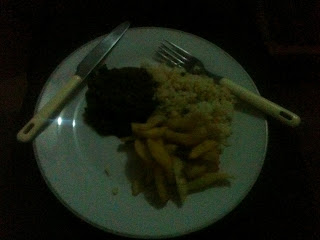I've given up trying to take photographs of dinner in Albert's dark living room (for the moment). Instead I thought I'd post these photographs of some plantain trees in Albert's garden. The plantain is the harder, more savoury cousin of the banana, and it often pops up in food (cooked) here. The old man saw me looking at the plant and informed me that in Kinyarwanda, plantain is igitoki.
I wanted to go for a walk as the only time I get to myself is usually when I'm sleeping, and even then, the mosquitos seem intent on interrupting my thoughts. I told Albert that I would go for a walk, and by the time I had my shoes on, Jado, the boy, had his on and was ready to escort me for my walk. In this situation, I think it's better to go along with it. As it happens, it was a very enjoyable amble. Jado taught me lots of Kinyarwanda, which I can summarise best in these phrases.
kugenda mu rugo n'amaguro = to go home by foot
kugenda mu mujyi na moto = to go into town by moto (scooter taxi)
kugenda ku kazi n'imodoka = to go to work by car
kugenda kunywa amazi/inzoga = to go and drink water/beer
kugenda kurya igitoki = to go and eat plantain
igiti = tree
Very good. Dinner tonight was rice, potatoes, mystery meat, salad, no sombe (which I have discovered is made from the leaves of the cassava plant; nothing to do with spinach), and a beer.
*If you notice any of my Kinyarwanda spellings changing through my posts, it is either because I don't know how to spell the words, or because I've recently discovered the correct way.
















